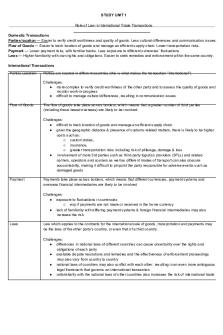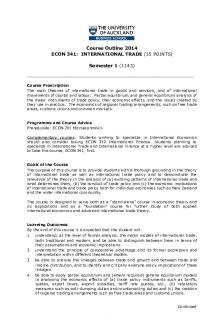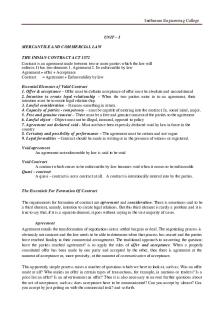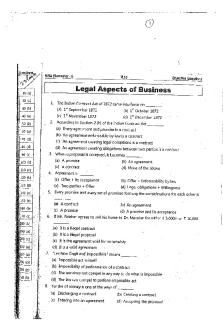Paper Legal Aspects of International Trade PDF

| Title | Paper Legal Aspects of International Trade |
|---|---|
| Course | Business Law |
| Institution | Addis Ababa University |
| Pages | 23 |
| File Size | 390.8 KB |
| File Type | |
| Total Downloads | 74 |
| Total Views | 162 |
Summary
General...
Description
See discussions, stats, and author profiles for this publication at: https://www.researchgate.net/publication/330066648
Legal Aspects of International Trade Article · January 2019 DOI: 10.21113/iir.v8i2.444
CITATIONS
READS
0
1,787
2 authors, including: Genc Mekaj 6 PUBLICATIONS0 CITATIONS SEE PROFILE
All content following this page was uploaded by Genc Mekaj on 23 October 2019. The user has requested enhancement of the downloaded file.
Kreshnik Aliaj, Genc Mekaj
Abstract International law serves to increase international trade, investment and promote prosperity. These laws and mechanisms fall into two main categories, the private law of international trade and international public law, albeit there is a significant overlap between the categories. The law on private trade deals with the rights and obligations of international traders and investors facing each other. Here, there is a need for mechanisms to resolve the conflicts of laws between persons from different legal systems. There is also a value in promoting harmonization initiatives to reduce trade transaction costs between people from different legal cultures. Where there is a law on international trade, there is a need to develop an appropriate compromise between the sovereign rights of the nation states and the desire for cooperative behavior between them. Here, there is a special need to identify processes and mechanisms to promote the normative effect of international rules, given the lack of any form of coercion over national states. Insufficient and inefficient laws and mechanisms will be a disincentive to trade and productive investment. Key words: International Trade; Foreign Trade; Trade law; Commercial law; www.dx.doi.org/10.21113/iir.v8i1.384 _____________________________ ILIRIA International Review – Vol 8, No 2 (2018) © Felix–Verlag, Holzkirchen, Germany and Iliria College, Pristina, Kosovo
MA. Kreshnik ALIAJ, MA. Genc MEKAJ
Legal Aspects of International Trade
172
MA. Kreshnik ALIAJ, MA. Genc MEKAJ
1. Introduction International trade says otherwise foreign trade involving the exchange of goods, services, capital and intellectual personal rights between individuals of different states is interpreted differently in different aspects. Foreign trade is interpreted in two different meanings. In the first sense, this type of trade means the turnover of goods from different countries, while foreign trade in its second sense, other than the turnover of goods, means the turnover of capital services, labor force, information transfer, etc. Based on this, depending on the currency exchange in foreign trade are distinguished: international freight exchange, international exchange of services, international capital movements (benefits) and the international labor force movement. Currency exchange involves the international exchange of goods as one of the most specific types. Moreover, it is alluded to the fact that trade in goods at international level exists earlier than the domestic trade of goods. In ancient times, individuals made various exchanges between nature and then traded between members belonging to different tribes. With the introduction of capitalism, conditions have been created for the development of contemporary commerce, and within them, contemporary foreign trade. The value of commodity exchange is permanent, though in the last decades of the 20th century, relative reductions in its participation in world trade became apparent. International trade has a positive impact on economic growth. When referring to the international law of international trade, the institutions are called upon and the rules or conditions that were created after World War II. Through these bodies was required the creation of an appropriate legal environment to regulate the global flows of goods and services (Charnovitz 2011). Although the first steps for international trade law are present in the twentieth century, the current multilateral system is a relatively new phenomenon, enabling the post-war geopolitical context (Mazower 2012). 2. Aspects of International Trade International law is defined as a set of norms and rules that states should pursue when attempting to cooperate with one another. International Law may include three distinct legal processes that can be identified as International Public Law (Relationships between sovereign _____________________________ ILIRIA International Review – Vol 8, No 2 (2018) © Felix–Verlag, Holzkirchen, Germany and Iliria College, Pristina, Kosovo
Legal Aspects of International Tra de
173
states and international entities such as the International Criminal Court), International Private Law (Addressing Conflict Jurisdictions) and Supranational Law (Set of collective laws that sovereign states give voluntarily). The law is perceived in different ways. According to domestic law, we understand the law as a rule that the state puts under control the lives of its citizens. These rules are usually created by the legislature, interpreted by the judiciary and implemented by the executive branch, using the police, if necessary, to compel citizens to obey. There are a number of Treaties and other types of agreements between countries that set rules for international trade and finance, such as GATT; Encourage cooperation on environmental protection; and the establishment of fundamental human rights, such as the International Covenant on Civil and Political Rights. Meanwhile, among many international organizations, the United Nations facilitates international diplomacy, the World Health Organization coordinates public health and international protection and the International Labor Organization monitors and promotes workers' rights around the world. Foreign trade represents a complex activity which is characterized by significant specificities in relation to domestic trade. The specification of domestic trade in relation to that of the outside does not only stem from the differences in market size and the preferences of the buyers, but also of the differences in the socio-economic systems between different countries. Within that framework are highlighted the differences of national policy of partner countries in the field of foreign trade system, foreign exchange system, credit system with foreign countries, fiscal system etc. At the same time; the exchange in general is carried out on a non-equivalent basis where the disproportionate division of the excess of value between the subjects in exchange occurs, ie the revenue spill (one wins, the other loses or one wins more than the other of the actual work outcomes and past). The unequal distribution in the surplus value has different effects on the national economy in the exchange of goods and services in domestic and foreign trade.
_____________________________ ILIRIA International Review – Vol 8, No 2 (2018) © Felix–Verlag, Holzkirchen, Germany and Iliria College, Pristina, Kosovo
174
MA. Kreshnik ALIAJ, MA. Genc MEKAJ
A. The sources of international law include1: International treaties: kinds, significance and the sphere of application. Treaties are similar to contracts between countries; promises between States are exchanged, finalized in writing, and signed. States may debate the interpretation or implementation of a treaty, but the written provisions of a treaty are binding. Treaties can address any number of fields, such as trade relations. Bilateral treaties: kinds, significance and the sphere of application. Uniform laws. Codes of conduct. Arbitration rules. Acts of international organizations. National legislation as applicable to international trade. B. The main actors of International Trade include: States that imply different approaches of developed and developing countries to the international legal framework governing international trade. States play a key and indisputable role in the creation of international law. Determining whether an entity is actually a state presents a challenge on its own. Most sovereign countries are both de jure states (in law) as well as de facto (in reality). Corporations. Corporations sometimes called multinational corporations are playing a growing role in the development of international law. Corporations are commercial entities whose profits are profit-driven. Corporations lobby states and international organizations in a way similar to NGOs, in the hope that their interests will be protected under international law. Many of the same suspicions about the accountability and legitimacy of NGOs can also be raised in the context of corporations. International organizations, otherwise known as intergovernmental organizations or NGOs, are formed between two or more state governments. Some NGOs act by making decisions based on a vote for each member state, some making decisions on the basis of consensus or unanimity, while others have weighted voting structures based on security interests or monetary donations.
1
http://www.globalization101.org/uploads/File/Inter/interall.pdf
_____________________________ ILIRIA International Review – Vol 8, No 2 (2018) © Felix–Verlag, Holzkirchen, Germany and Iliria College, Pristina, Kosovo
Legal Aspects of International Tra de
175
Regional organizations. Juridical persons. Physical persons. The position of individuals under international law has evolved significantly during the last century. Now, more than ever, under international law individuals are being given more rights and being held responsible for their actions. Human rights law, for example, has tried to establish that every person around the world has certain basic rights that cannot be violated. Arbitration associations. C. International commercial contracts: Contracts are considered "international" when two or more states conclude an agreement (see United Nations Convention on Contracts for the International Sale of Goods (Vienna, 1980) (Article 1 (1), Principles on the Law Choice in International Trade Contracts (2015) ("The Hague Principles"), Article 1 (2). The parties to a contract are allowed to choose both international law and the governing law for their contracts. If the parties fail to choose an applicable law, a court that accepts the jurisdiction of the dispute will have to apply the relevant rules of the conflict of international private law to determine which law is applicable to the contract, including any international instrument that may be implemented in absentia. In the international trade practice, it is common for parties to choose arbitration as a method for settling disputes (Schwenzer et al., 2012). International trade arbitration may be particularly popular because unlike court rulings there is a single almost inclusive regime for enforcing foreign arbitration decisions. D. Risk analysis in international trade There are some risks that need to be taken into account when discussing international trade. The nature of risk analysis in international trade is a key concept that helps to understand how the risks of international trade operate. Systemic nature of the risk analysis. Commercial risks. Political risks. Legal risks _____________________________ ILIRIA International Review – Vol 8, No 2 (2018) © Felix–Verlag, Holzkirchen, Germany and Iliria College, Pristina, Kosovo
176
MA. Kreshnik ALIAJ, MA. Genc MEKAJ
3. International Trade Law International trade law laws exist with each other. Sometimes they overlap and in other countries their relationships are determined (Charnovitz 2002). International law is the entire system of legal rules and customary practices governing the interactions between states. International law is a collection of legal ideas, customs, treaties and legal organizations that includes the acquisition of treaties, the articulation of rights to states and (and some groups of people), the regulation of the oceans and the making of war and peace (Kennedy 2006). Entities dealing with foreign trade represent the national economy at the international and world level, hence their economic and moral obligation, to preserve the authority of their country. From the specifics of foreign trade, it is also seen the tendency to make it effective. Entities dealing with foreign trade, in order to perform efficient and rentable work, must reach international competition for the introduction (debut) in the market. They should be well aware of the provisions for regulating foreign trade, both national and those applying in the countries of business partners. This type of compactness is conditioned to achieve high levels of technical equipment and staffing by foreign trade entities. Realizing the potential benefits of foreign trade in any national economy and not allowing the share of excess value to flow always to foreign countries that poses a challenge to the state government, which justifies its involvement in regulating flows in having a sphere. The state through the adoption of measures and protective policy instruments tends to influence the improvement of the position of local entities and foreign trade, but also in the domestic market as well as in the international markets. Within this wide and incomplete and sometimes fragmented international system lies a law often called international economic law (Koskenniemmi 2006). This transnational regulatory treaty and transnational regulatory body includes commercial law, global and regional investment law, commercial law, and law dealing with taxation, financial regulation, competition and intellectual property (Guzman and Sykes 2008). International trade habits are "unwritten rules" used in business relations between partners in foreign trade and international economic relations in general. Trade habits, as if rules for regulating the relations of foreign trade participants are not adopted by the state legislature, legal _____________________________ ILIRIA International Review – Vol 8, No 2 (2018) © Felix–Verlag, Holzkirchen, Germany and Iliria College, Pristina, Kosovo
Legal Aspects of International Tra de
177
institutions or others, but derive from the multi-annual work practices of the international markets, with stable stihic behavior of people. But over time, it has also been modified through the formation of meaningful meanings for the correct or incorrect behavior of people in the same social cases. then the correct behavior has passed into the habit and is morally accepted, in ordinary reality, normal behavior, behaviors that are compulsory. So, social consciousness is created that any different behavior is contrary to the moral of the government in society. In this way, many years of practice have built good business habits, which at their base have the commercial and business morality of participants in trade and business in general. In addition, trade practices include: honor, loyalty to competition, giving true information about themselves and other participants in trade exchanges, adherence to the given word, non-betrayal of business secrets important to the interests of the partner, realization of the tasks obtained from the contract etc. The common honor standard is in moral norms in general, and within good business habits it is understood that the conduct by which each of the legal business partners provides accurate data for itself and for its signature. According to Lester, Mercury and Davies (2012), the term itself is somewhat difficult to define because it is often used to refer to the largest body of the international economic law as well as deals directly related to the flow of goods and services across national borders. For this reason, most of the initial legal texts focus on the law regarding "legal instruments regulating trade flows"; the type, quantity, qualities and quality of the goods that are the subject of sale; respecting the deadlines for the delivery and ordering of goods and payment; they do not question their partner; fully respects the given word and consequently adheres to the promises it has given, etc. Trade habits are severely condemned by the unfair practice of competition in the international market, as well as the injuries of the enterprise's authority and the country of profit with foreign trade. From the unfair competition in the international market are specifically referred to these activities of the foreign trade subject; unfair advertising when released publicly; not true of the goods or services that its enterprise or any other enterprise works, and for the purpose of finding an interest in itself; false signs of the origin of the goods; disclosure of false information about its own enterprise or another enterprise; misuse of trademarks for their _____________________________ ILIRIA International Review – Vol 8, No 2 (2018) © Felix–Verlag, Holzkirchen, Germany and Iliria College, Pristina, Kosovo
178
MA. Kreshnik ALIAJ, MA. Genc MEKAJ
enterprise or the alien; injury or exploitation of business secrets and the like. As an injury to authority in foreign trade, each conduct is contrary to good business practices, which incites or may cause more serious injuries to the obligations of the agreement. In case of non-compliance with the aforementioned norms and other customs, different sanctions are used; public mockery, boycott, public announcement of the name and signature of the one who behaves contrary to the moral standards of business, a socalled "black list" advertisement; sentencing by the honorary courts of chambers and other business associations etc. Commercial law is taken as different from international law because it is practiced by field specialists dealing with internal regulation or by GATT specialists in Geneva (2012). After the establishment of the WTO, one has been increasingly seen with great importance, the interpretation of international law in WTO law (Pauwelyn 2001, Trachtman 2004, Bartels 2001). Lester et al (2012) examines a number of approaches to the theorization of the place of commercial law in the broader system of international law, concluding that there is still a general lack of clarity about the scope of international law in the commercial system. Foreign trade is a pluralistic and multidisciplinary field of study with deep roots in philosophical similarities with politics and economics (Cropsey 1960). Trade law is seen as a factor of global development. International trade is driven by some internal forces. According to Helpman and Krugman, "economies of scale provide additional incentives and promote trade even if countries are identical in tastes, technology and factor factors" (1989). Compliance of open markets with economic development remains an important part of the intellectual infrastructure underlining the multilateral project (Bhagwati 2008). Trade law affects global political interdependence. It is low the possibility of an uncompromising adjustment between popular democracy and the international trade regulation, highlighting the economic benefits of technological and economic integration (Abbott and Snidal 1998). Civil governments and intergovernmental organizations are holding international governments, which has raised doubts and questions about the changing nature of the relationship between national governance and trade regulation (Jackson 2009). _____________________________ ILIRIA International Review – Vol 8, No 2 (2018) © Felix–Verlag, Holzkirchen, Germany and Iliria College, Pristina, Kosovo
Legal Aspects of International Tra de
179
Issues such as dispute resolution between investors and states (Choi 2007) are often discussed by critics and scholars, but the scholarship has evolved into discussions of the impact of legal mechanisms on participation in multilateral trade governance (Shaffer 2009), the causes and consequences of trade (Krugman 2013) and the impact of a hyperglobalized trading system on a number of issues ranging from climate change to currency wars and food security (Subramani...
Similar Free PDFs

Legal Aspects of Nursing
- 5 Pages

MCQ - Legal Aspects of Business
- 25 Pages

Legal Aspects of Business MCQs
- 26 Pages

International Trade Assignment 2
- 4 Pages

International Trade - Grade: B+
- 9 Pages

LOG305; International Trade LAW
- 39 Pages

PART 6 International Trade
- 5 Pages

International Trade Law
- 53 Pages

318 LMS - International Trade
- 2 Pages
Popular Institutions
- Tinajero National High School - Annex
- Politeknik Caltex Riau
- Yokohama City University
- SGT University
- University of Al-Qadisiyah
- Divine Word College of Vigan
- Techniek College Rotterdam
- Universidade de Santiago
- Universiti Teknologi MARA Cawangan Johor Kampus Pasir Gudang
- Poltekkes Kemenkes Yogyakarta
- Baguio City National High School
- Colegio san marcos
- preparatoria uno
- Centro de Bachillerato Tecnológico Industrial y de Servicios No. 107
- Dalian Maritime University
- Quang Trung Secondary School
- Colegio Tecnológico en Informática
- Corporación Regional de Educación Superior
- Grupo CEDVA
- Dar Al Uloom University
- Centro de Estudios Preuniversitarios de la Universidad Nacional de Ingeniería
- 上智大学
- Aakash International School, Nuna Majara
- San Felipe Neri Catholic School
- Kang Chiao International School - New Taipei City
- Misamis Occidental National High School
- Institución Educativa Escuela Normal Juan Ladrilleros
- Kolehiyo ng Pantukan
- Batanes State College
- Instituto Continental
- Sekolah Menengah Kejuruan Kesehatan Kaltara (Tarakan)
- Colegio de La Inmaculada Concepcion - Cebu






